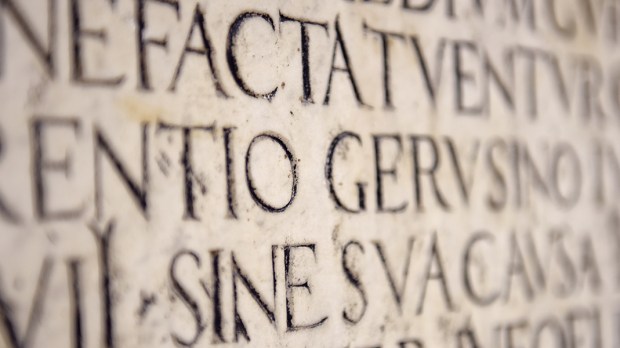Lenten Campaign 2025
This content is free of charge, as are all our articles.
Support us with a donation that is tax-deductible and enable us to continue to reach millions of readers.
Fr. Reginald Foster, one of the world’s leading experts on the Latin language, died on Christmas, December 25, shortly after midnight in a nursing home in Milwaukee, Wisconsin. The timing of the 81-year-old priest’s passing was notable: at least in normal times, churchgoers might have been singing Adeste Fideles, with at least one verse in Latin, at Midnight Mass, just at that moment.
Fr. Foster, who never lost sight of his humble origins as the son of a plumber, even as he worked in the Vatican translating documents for four popes, died of complications from COVID-19.
He worked in the Vatican’s Secretariat of State from 1969 until retiring in 2009, but also taught Latin at the Pontifical Gregorian University. It is perhaps through his teaching that he became particularly well-known and loved.
And his methods have inspired successive generations of students and given Latin new life in unexpected places.
Born in Milwaukee on November 14, 1939, Reginald T. Foster assisted his father in his plumbing work, but he knew he wanted to be a priest from an early age. After getting a Catholic education in elementary school, he attended minor seminaries locally and in New Hampshire. In 1958, he joined the Order of Discalced Carmelites, studying philosophy at the Basilica and National Shrine of Mary Help of Christians at Holy Hill in Hubertus, Wisconsin. In 1962, he professed solemn vows in the order, and headed to Rome, where he was ordained a priest in April 1966.
Entree into the Vatican
Because bishops attending the Second Vatican Council wanted to make statements in Latin, Fr. Foster offered some of them instruction in the language. In 1969, Foster was invited to go to work for the Office of Latin Letters of the Vatican Secretariat of State, to assist in the translation of papal and other documents into Latin. Fr. Foster, who was also fluent in Italian, German and Greek, went on to serve four popes — Paul VI, John Paul I, John Paul II, and Benedict XVI.
“When there was an encyclical to be translated; a congratulatory letter to a cardinal or bishop to be written; a contemporary term, like ‘microchip’ that sang out for a Latin equivalent (he chose ‘assula minutula electrica’: ‘tiny amber wood chip’); or, after John Paul II approved a no-smoking ordinance in Vatican City, a sign to be posted (proposed wording: ‘Vetatur Fumare’), it turned again and again to Father Foster,” said his obituary in the New York Times. “Even in retirement — he resettled in Milwaukee in 2009 — Father Foster continued to prepare the 140-character missives that flew from the Latin Twitter account of Benedict, @Pontifex_ln.”
Not only that, he helped provide a Latin option for anyone using Vatican City’s A.T.M.s. “Inserito scidulum quaeso faciundam ut cognoscas rationem,” the machines’ display read.
Fr. Foster was a firm believer that Latin is a very accessible language, and he used colorful language to drive home the point.
“You do not need to be mentally excellent to know Latin,” he said in an interview with the Telegraph. “Prostitutes, beggars and pimps in Rome spoke Latin, so there must be some hope for us.”
“He was, quite simply, the most fascinating, most unbelievable, most ‘what in God’s name is this guy doing in the Vatican?’ personality to stalk the corridors of the Apostolic Palace in, probably, the last 100 years,” recalled Vaticanista John L. Allen Jr. in a tribute at Crux.
Allen recalled Fr. Foster as “a man of deep faith, who walked the talk.”
“I lost track over the years of how many times I’d be walking across Rome and spot Foster sitting on a bench for the bus giving a sandwich to a homeless person, or chatting up a beggar outside a grocery store, or helping an old Italian lady find her way,” he wrote.
The Latin tradition
Along with author Daniel P. McCarthy, Foster wrote Ossa Latinitatis Sola ad Mentem Reginaldi Rationemque (“The Mere Bones of Latin According to the Thought and System of Reginald”), published in 2016.
A 2018 CBS News interview explained that Foster scrapped traditional methods of memorizing tables of text and instead treated Latin as a living, spoken language. “It was a radical departure in approach.”
And it has had ripple effects throughout the world.
“He has scores of students who have become Latin teachers, several who have become Ivy League professors,” Jason Pedicone, a former student, told CBS. “That has affected a change on the culture of the way Latin is taught.”
Pedicone went on to found the Paideia Institute to carry on Foster’s work and to bring Latin into underserved American classrooms.
One young beneficiary of that work is Grace Milliman, who remembers her first day of Latin class as the day ”my entire life changed.”
Pedicone commented on the experience of such students: “Seeing a young person that excited, even if he doesn’t want to admit it, I think would make Reginald really really happy,” he said. “And I think that in her, he will live on and the tradition will live on.”

